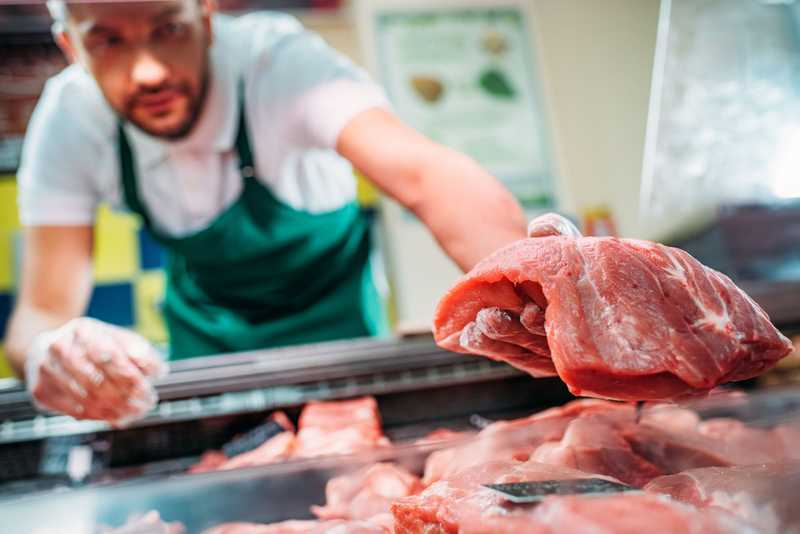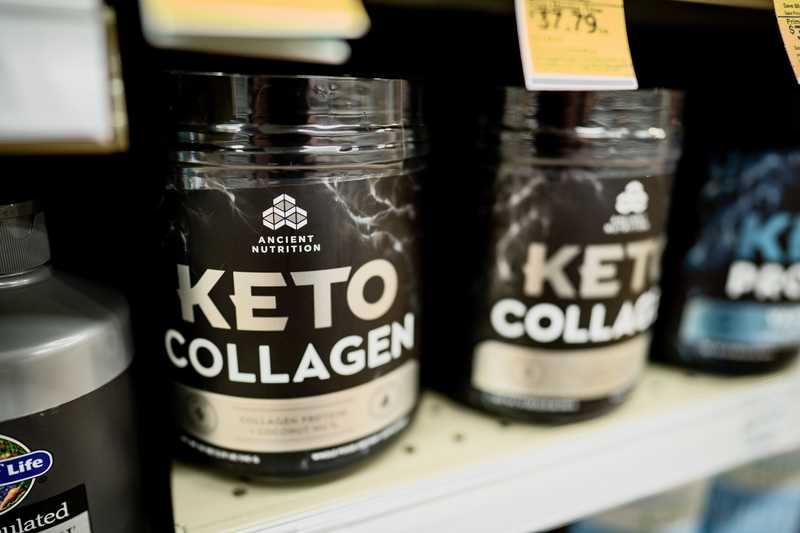Do you eat enough protein? Or do you think you eat too much? Or not enough?
If you listen to the news you probably think most Americans are eating too much protein, but in reality that's likely not true.
If you struggle with cravings, low energy, muscle weakness, high blood sugar, high cholesterol, trouble losing weight, anxiety, depression, ADHD, frequent illness, osteopenia/osteoporosis, and/or brittle hair or fingernails — I can almost guarantee, you are NOT eating enough protein.
Table of Contents
- What is Protein?
- Why is Protein Important?
- Why Building and Maintaining Muscle is Important
- How Does Protein Build Muscle?
- Can You Build Muscle without Protein?
- Does Protein Build Muscle without Working Out?
- How Much Protein Do I Need?
- What I Realistically Recommend for Protein Intake as a Dietician
- What are the Best Sources of Protein?
- How to Include Protein at Your Meals
- Does Protein Give You Energy?
- Does Protein Cause Health Problems?
- Finding the Right Protein Balance
What is Protein?
Protein is made from amino acids (molecules that create proteins). There are 20 amino acids, all found in different amounts in a variety of foods. Some can be made by the body to support itself, but 9 are essential and not made by the body. Instead, you must get them from food.
A complete protein is defined by the amount of essential amino acids that it contains to meet the body’s needs. Whereas, an incomplete protein, which lacks one or more amino acids, must be paired with other foods to meet the body's nutritional needs.
Why is Protein Important?
You need the amino acids from protein for many different bodily functions, including:
- Enzymes: They support the chemical reactions that take place in our cells and digestive system to gain energy for cellular functions.
- Muscles: Maintaining muscle mass is the key to longevity and the foundation of your metabolism. Muscle helps regulate blood sugar and blood lipids(fat). Plus, they also keep you moving, active, and participating in your daily activities.
- Hormones: Protein is needed to make all our hormones including insulin, estrogen, progesterone, and testosterone.
- Bones: Bone health is supported in a variety of ways by protein, including optimal calcium absorption. A high protein diet has also been shown to reduce hip fractures in postmenopausal women.1
- Memory/Mood: The amino acids found in protein help make neurotransmitters like Serotonin, Dopamine, and GABA. Without adequate levels of these brain chemicals, you might feel moody, anxious, depressed, or have trouble concentrating.
- Hair & Nails: Your body makes keratin and uses it to build your hair and nails. To make keratin you need the right amino acids especially: lysine, cysteine, arginine, and methionine.
- Immune system: The amino acids Arginine, glutamine, and cysteine are very important for the immune system. A lack of overall protein can impair the activation of a person's immune system and their production of antibodies.2
Why Building and Maintaining Muscle is Important
There are a few key elements that adequate muscle mass is important for, let's review.
Supporting a Healthy Aging Process
As we age, our muscles become less efficient at repairing themselves. We succumb to sarcopenia, the gradual loss of our muscle tissue. While this is a normal process, too much muscle loss can lead to a rapid decline in quality of ife.
Think of a weak or frail grandparent. Regardless of body size, if they aren't moving or exercising enough — and not eating enough protein — they can become very weak and susceptible to secondary risks like falls, depression, poor daily function, and more.
Thankfully, we can slow the aging process with strength training and adequate protein intake.
Supporting Vital Organs
Muscles also serve as an amino acid reservoir. In times of stress or starvation, your body can take amino acids from muscles to sustain other vital organs like the liver, kidneys, heart, and brain.
How Does Protein Build Muscle?
Our bodies are constantly breaking down and rebuilding to maintain vitality.
When you exercise and adequately stress your body and muscles, you use up amino acids and cause 'micro-damage' to our muscles. This stimulates muscle rebuilding.
Protein comes in and helps repair the muscles, making them stronger or, depending upon how your training, bigger.
Can You Build Muscle without Protein?
Without adequate protein, you will be in what is know as negative nitrogen balance, where muscle is being broken down faster than it is being built.
In reality, to build muscle you need adequate calories (or even extra), adequate protein, and exercise.
Does Protein Build Muscle without Working Out?
Simply eating protein won't help you pack on pounds of muscle either. However, it can prevent you from losing more muscle tissue than you might if you are unable to exercise for a period of time. For example, if someone who breaks their leg and can no longer participate in their preferred activities.
How Much Protein Do I Need?
The short answer is, "it depends."
Nutrition expert Marty Kendal has this to say:
People who are lean and young, with healthy hormone levels, don’t need to worry (as) much about their protein intake. However, as we age, we are less active, anabolic hormones decrease, and insulin resistance increases; we need to pay more attention to getting adequate protein in our decreasing energy (calorie) budget.3
RDA Dietary Guidelines
The RDA (Recommended Dietary Allowance) for protein — 0.8g/kg or 0.36g/lb — is in my opinion, and many other professionals opinions, much too low. Highly active people may need up to 0.8/lb. The RDA is a number set for survival. It's the amount needed to keep you alive and functioning. Not the amount needed to thrive.
According to these guidelines, that means that a 200 pound man would only need 72-160g protein/day. And a 150 pound woman would need 55-120g protein/day.
IPB Dietary Guidelines
The International Protein Board (IPB), the global authority on protein intake, recommends a minimum of 1.1 grams per kilogram of body mass for general health, and increasing amounts as you age — plus more if you exercise or play sports. For exercise, fat loss, and healthy aging, the range starts at 1.4 grams per kilogram and tops out at 2.5 grams per kilogram of body mass.4
Using these measurements our 200 pound man and 150 pound woman actually need between 100-227g/day and 75-170g/day respectively. This will also depend upon their age, activity levels, overall health status or goals.
What I Realistically Recommend for Protein Intake as a Dietician
Having worked with clients, along with reading studies, I recommend people aim to get about 30g of protein at each of their 3 meals, every day. For people trying to build muscle, recovering from an injury or major surgery, working very active jobs, or are participating in sports, this might increase to 50g at 3 meals, or maybe 30g at 4-6 meals/snacks during the day.
Why 30 grams?
30g is the minimum amount of protein required to stimulate muscle maintenance and repair.
Eating adequate protein at each meal supports better satiety and appetite regulation. It also makes it easier to hit your daily requirements for protein than saving it all up for one meal at the end of the day.
What are the Best Sources of Protein?
Despite what you might hear in the news, most people are not eating enough protein. Especially when you use the IPB recommendations. The move to encourage a 'plant-based' diet has not helped. By avoiding animal products, most people drastically cut their overall protein intake and simply start eating more processed carbs.
A recent literature review found that most older adults are not consuming enough protein, and that Sarcopenia (muscle loss) is a big problem within this population. The scientists also found that vegan diets likely do not prevent or improve sarcopenia, and may in-fact worsen it.5
While I completely respect peoples moral choice to abstain from eating animal products, there is no denying that you have to eat a lot more plant protein than animal based protein to get to the magic 30g of protein per meal. Also, know that plant protein is less absorbable (by about 50%) than animal — even when consuming the same amount.
Examples of Food Protein Content
- 1 can of beans (24g protein, 406 calories)
- 1/2 cup of peanut butter (32g protein, 759 calories)
- 1.5 Beyond Meat Burger Patties (30g protein, 345 calories)
- 12oz Firm Tofu (24g protein, 280 Kcal)
- 1 cup Plain 2% Fat Greek yogurt (25g protein, 180 calories)
- 1 scoop Whey Protein Powder (25g protein,120 calories)
- 5 eggs (31g protein, 382 calories)
- 5 oz salmon (29g protein, 230 calories)
- 3.5 oz Chicken Breast (30g protein, 164 calories)
- 4oz Marbled Steak vs Lean Steak (30g protein, 239 vs 170 calories)
As you can see, if you are trying to hit your protein needs while still staying with in a typical 1800-2200 calorie range, it will be a lot easier by choosing more animal based protein sources instead of relying on plants.
In one study, researchers looked at the amount of amino acids in participants blood after eating equal protein amounts from either lamb, beef, or Beyond Burger (BB). Results showed that "The BB meal produced significantly lower plasma concentrations of total, essential, branched-chain, and non-proteogenic amino acids." Meaning that over time, relying on this meat substitute would not support or meet the person's protein needs.6
Can You Get Enough Protein as a Vegan or Vegetarian?
Yes, there are many healthy people and athletes who choose to eat vegetarian and vegan diets. But they are probably eating a wide variety of produce, nuts, beans, and some dairy. Not just relying on the typical vegetarian filler foods of pasta and bread. These people likely have genes that make it easier for their bodies to absorb plant based proteins.
What About the Environment?
This part gets even more complicated than the Krebs cycle. If you are concerned about the impact of raising animals for food on the environment I highly recommend reading Sacred Cow by Diana Roggers and Robb Wolf, as well as reading Diana's blog 'Sustainable Dish.'
What About Collagen?
You may have heard that collagen powder is a good source of protein. While it does contain essential amino acids, it is lacking in leucine and does not trigger the same metabolic or muscle building response as more complete proteins. However, it can still be good to add to your diet, especially if you struggle with joint pain.
To learn more read our article all about collagen.
How to Include Protein at Your Meals
Its easy to hit your protein needs at each meal when you start your meal plans with protein as your focus. Choose your protein source and then add lots of produce. Here are some examples:
- 2-3 eggs + 1 oz Ham + 1 Slice PB toast + sautéed Peppers & onions
- Smoothie made with whey or egg white protein powder
- 1 cup cottage cheese + 1oz pecans + berries
- 3oz deli meat + 1 oz cheese in 1/2 pita pocket + Veggies & Dip
- 3 oz grilled chicken + 1/2 cup black beans + giant salad + salsa
- 5oz Salmon + Green Beans + Wild Rice
- 4oz Steak + Asparagus + butternut squash
- 4 Turkey meatballs + marinara sauce + lentil pasta + broccoli
Does Protein Give You Energy?
Yes, protein gives you energy...Kind of.
It's not the same energy as your cup of coffee. Any source of protein, carbohydrate, or fat can become fuel for your cells, called ATP. However, carbs and fat are the preferred fuel sources.
What many people notice when they start eating more protein is that they feel more balanced. Instead of the big energy swings, eating protein throughout the day keeps blood sugar levels more even. This, in turn, makes them feel more energized.
Does Protein Cause Health Problems?
Unless you ALREADY have kidney disease or another health problem that decreases your ability to properly process amino acids, the answer is no. And, it is almost impossible to eat too much protein from whole food sources. You will be way too full.
There are ongoing debates about the healthfulness of red meat, poultry, eggs, fish, etc. This blog is not extensive enough to cover all of this. However, what I see when working with patients is that when they eat the right types and the right amounts for THEIR body, they feel better and their health improves.
Finding the Right Protein Balance
Getting enough protein can look very different for each individual. The best way is to experiment with foods and take note of how you feel after your meals (more energy, low energy, bloated, etc.)
If you're not sure where to start, I highly recommend booking a virtual consultation with a CityPT dietician.
Before you go, please read our disclaimer. This blog is intended for informational purposes only. We are not providing legal or medical advice and this blog does not create a provider-patient relationship. Do not rely on our blog (or any blog) for medical information. Always seek the help of a qualified medical professional who has assessed you and understands your condition.
References
Footnotes
-
Bonjour, Jean-Philippe. "Protein Intake and Bone Health." International Journal for Vitamin and Nutrition Research. Internationale Zeitschrift Fur Vitamin- Und Ernahrungsforschung. Journal International de Vitaminologie et de Nutrition, vol. 81, no. 2–3, 2011, pp. 134–142, doi:10.1024/0300-9831/a000063. ↩
-
Li, Peng, et al. "Amino Acids and Immune Function." The British Journal of Nutrition, vol. 98, no. 2, 2007, pp. 237–252, doi:10.1017/S000711450769936X. ↩
-
Kendall, Marty. "Menopausal Weight Gain: The Problem and Solution Explained." Optimising Nutrition, 3 Oct. 2022, https://optimisingnutrition.com/menopausal-weight-gain/. ↩
-
Protein Is a Critical Macronutrient That Supports Reproduction, Growth and Development." Internationalproteinboard.org. Accessed 9 Oct. 2022. ↩
-
Domić, Jacintha, et al. "Perspective: Vegan Diets for Older Adults? A Perspective on the Potential Impact on Muscle Mass and Strength." Advances in Nutrition (Bethesda, Md.), vol. 13, no. 3, 2022, pp. 712–725, doi:10.1093/advances/nmac009. ↩
-
Pham, Toan, et al. "Plasma Amino Acid Appearance and Status of Appetite Following a Single Meal of Red Meat or a Plant-Based Meat Analog: A Randomized Crossover Clinical Trial." Current Developments in Nutrition, vol. 6, no. 5, 2022, p. nzac082, doi:10.1093/cdn/nzac082. ↩

Brenna holds a Master's in Applied Nutrition from Northeastern University in Boston and a Bachelors of Science in Dietetics from Minnesota State University, Mankato. She is passionate about teaching people how foods interact with their body and helping them learn how what they eat affects how they feel.

Brenna holds a Master's in Applied Nutrition from Northeastern University in Boston and a Bachelors of Science in Dietetics from Minnesota State University, Mankato. She is passionate about teaching people how foods interact with their body and helping them learn how what they eat affects how they feel.


